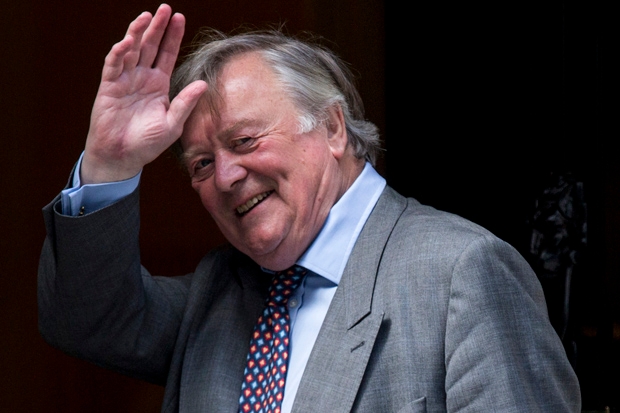It always used to be said that, if it had been up to Guardian readers, Ken Clarke would certainly have been leader of the Conservative party. It might have gone beyond that. Some politicians are much loved by the general public, who never have to meet them, and loathed by their colleagues and unfortunate underlings — one thinks of Greville Janner or Alf Morris, who once pushed his fist into my face when I was refusing to do his bidding. That doesn’t seem to be true of Clarke, who is popular pretty much across the board, his instincts for decency and sceptical intelligence ensuring that. Although his Europhile commitments effectively barred him from the party leadership on the occasions when he might have stood a chance, his qualities have always been recognised.
The memoir has a beautiful and ingenious title from this aficionado of jazz, but is a slightly patchy piece of work. Clarke’s appeal is largely personal, but he is not going to open his life up to readers. He has taken the honourable decision not to write about family matters, and his wife, children and grandchildren only appear in small roles. It is sad and touching to hear that Clarke’s wife Gillian, a highly intelligent woman, was so upset by one BBC comedian saying that ‘the prospect of seeing Kenneth Clarke go to his grave’ cheered him up that she phoned the corporation in anger and distress. Much more than that, Clarke will not share with readers.
More disappointingly, his very interesting journey is only lightly sketched in: we are very swiftly past his childhood and the colliery-electrician father. The family background promises glorious material. There is a probably bigamous Suffolk grand-father who ran away to sea ‘because he could not bear… topping turnips in the rain’, and was deserted by his first wife on their wedding night; the other was a dedicated Stalinist, who made his money from winning newspaper competitions; while a great-grandfather drank and gambled away the family fortune at Doncaster races. Sadly, we are through all this excellent material in four pages. It would have kept V.S. Pritchett occupied for many chapters.
The memoir, then, is confessedly a political account of Clarke’s career, and, fairly clearly, has been based on recollection rather than the long hours in government files to which politician-memoirists are entitled. It grows markedly more vivid and detailed as it comes closer to the present. In the first half, we are quite often told that an acquaintance proved themselves ‘delightful’ company or became a good friend without the specifics coming to mind. Even Mrs Thatcher fails to emerge freshly. Perhaps Clarke is bored with the whole subject by now, but he doesn’t supply much solid material to recount what must have been a relationship full of detailed disagreement.
The career and the development of policy, nevertheless, is worth examining, and Clarke comes out with much credit. Interestingly, he was involved with the very first privatisations of the Thatcher government. (It is not quite true that, as he says, they were the first privatisations of postwar British history. Heath had privatised Thomas Cook and the pubs of Carlisle in the early 1970s.) Clarke, under Norman Fowler at the Department of Transport, was tasked with privatising the National Bus Company, the ports and National Freight which owned about a third of the country’s lorries, including Pickford’s. If you now goggle with amazement that, less than 40 years ago, the state thought it made sense to own a removal company, you will read Clarke’s account with some amusement. One of the arguments that the department put forward against privatising Pickford’s was that it might actually come to make a profit.
The detail starts to become more impressive in accounts of recent years, and Clarke’s personal charm emerges in some silkily bitchy comments: ‘All three of my principal challengers on the subject of “law and order” were eventually arrested and committed for criminal trial themselves.’ Blair and Brown’s years of increased public expenditure
certainly produced a good climate of opinion for the government as… public-sector pay and pensions in particular were raised to new heroic levels. Inevitably, there were also some improvements in the levels of service to the public.
There is, too, a keen sense of the comedy of public life. When, in 2010, he was appointed Justice Secretary, he discovered that nobody at No.10 knew where the ministry was; when he finally turned up, after a good lunch, he found that he had been expected for some time, the full complement of officials having reassembled to greet him four times. Clarke has a vivid turn of phrase: he is widely thought to have swung the leadership election in Theresa May’s favour with his overheard description of her as a ‘bloody difficult woman’, an observation which had the same effect as Pravda describing Mrs Thatcher as an ‘iron lady’ in 1976. I’m sorry his injunction in 1993 to the officious, interfering party chairman, Brian Mawhinney, to ‘tell your kids to get their scooters off my lawn’ hasn’t made it in.
He has been far too important to be described as a ‘national treasure’, but as one of the best, and most effectively reforming, postwar home secretaries and chancellors of the exchequer, he will certainly be remembered. Like all political careers, this one ended in failure; a bigger one than most for this most Europhile of Tories, but a much less personal one.
This book has its thin passages, and the project of self-justification is the same as any other political memoir; but it is hard not to finish it with a sense that Clarke had the unusual quality of mostly having been right about anything he set his mind to.






Comments